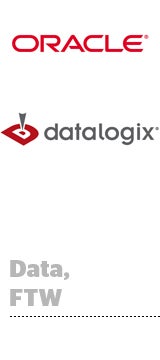 If you’re an Oracle competitor, the Datalogix acquisition looks formidable indeed. It adds considerable power to its data-as-a-service offering, which to this point had mostly online data.
If you’re an Oracle competitor, the Datalogix acquisition looks formidable indeed. It adds considerable power to its data-as-a-service offering, which to this point had mostly online data.
But if you’re a marketer using Oracle’s technologies – or using Datalogix data to link online advertising to offline sales – what additional benefits can you expect? While, in the natural, it appears that the Datalogix-Oracle union will further bridge the gap between online and offline marketing, analysts and agencies believe there are several ways this alliance could unfold.
“Now that a significant part of the offline-online data link from Datalogix is owned by Oracle, what will marketers be able to do that they couldn’t do before?”
Click below to read their responses.
- Cory Munchbach, analyst, Forrester Research
- Ray Wang, principal analyst and founder, Constellation Research
- Martin Kihn, research director, Gartner
- Gerry Bavaro, chief strategy officer, Resolution Media
Cory Munchbach, analyst, Forrester Research
Nothing. The capabilities Datalogix offer does not change just because they are part of Oracle now. In fact, I think there are some big questions outstanding about how Datalogix and BlueKai overlap and how they will work together. The opportunity at a high level is to be able to provide a more complete picture of the customer life cycle by adding the richness of the Datalogix data capabilities to the other modules in the Oracle suite. Marketers want more data to inform decisions and create competitive advantage, so in that way, this is a practical addition by Oracle. But the downside from the marketers’ standpoint is that this removes another independent data provider from the market, so marketers are left with few “neutral” players in the data space. This is yet another example of an acquisition that allows Oracle to talk extensively about what they will be able to do and all of these hypothetical scenarios that this will enable, but as I’ve said before and will likely say again, we’ll believe it when we see it.
Ray Wang, principal analyst and founder, Constellation Research
Marketers have a better shot of establishing the identity of their prospects and developing more contextually relevant campaigns [as a result of the deal]. While this is far from a closed-loop approach, the improved signal to noise ratio, and greater context, will be a good step toward improving return on [campaign] ROI. The market is ripe for consolidation. If a company like [Dun & Brandstreet] would get its act together, they could bridge B2C with B2B and become an insights network. Insight networks are the future business models. Companies well placed to do this are IMS, Nielsen and Bloomberg. In B2B, if Ariba gets big data business models, they have a shot. IBM has all the pieces, but chooses to play [as a] tech enabler. Oracle clearly wants in the space and we can expect more leadership from them in this area.
Martin Kihn, research director, Gartner
This is a big step for Oracle’s marketing hub – but for now just an incremental plus for marketers. On the positive side, it should be easier for marketers to know the offline impact of online campaigns and make better targeting decisions. Oracle can link cross-screen IDs with a significant panel of real-world transactions from Datalogix and give marketers a better understanding of cause and effect. For retailers and CPG companies in particular, this is critical, and together they’re one-third of digital ad spend. On the other hand, Oracle still doesn’t have a great attribution solution that tells marketers exactly which ad did what to offline sales. And there’s an open question how much of Datalogix’ data leaves the open market and can’t be used by marketers on other DMPs.
Gerry Bavaro, chief strategy officer, Resolution Media
The logical value will be easier, more cost-effective integration of Datalogix data with clients’ Oracle-housed customer data for shopper insights and offline measurement. Combined with BlueKai, there could be efficiencies in data use for segment creation for display, social, and content targeting vs. use of non-Oracle sources. Additionally there’s value of Datalogix data based on phone numbers and emails vs. cookies as consumers spend increased time on mobile and apps versus browsers. There’s a need for a scalable connector to this mobile behavior; this will likely be touted as a value proposition by Oracle as well.
Ryan Joe and Zach Rodgers contributed.














